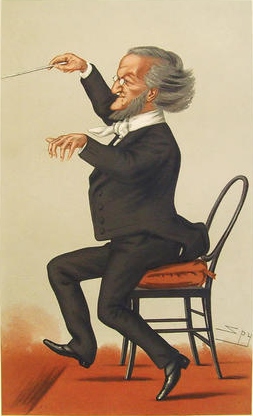Elitist versus pop?
8 August 2013 | Letter from the Editors

An elitist of his time? A caricature of Richard Wagner by Leslie Ward, published in Vanity Fair in 1877 (caption read ‘The Music of the Future’). Picture: Wikimedia
The old phrase ‘art for art’s sake’ has begun to sound like an appeal instead of an bohemian creed, without any negative ambiguity. Please let art be created for art’s sake!
In our times of neo-liberal ideologies, the criteria for assessing art include its capacity to generate profits to creative industries, to have export value, to be of assistance to business in general. But art, in essence, serves no ideology.
Technology now allows us to be more entertained than ever before, if we so choose. Art and entertainment alike come to us by the use of various devices. What has often been called ‘elitist’ art – opera, modern music, ballet – can be enjoyed lying on the sofa in the home. Money is not an obstacle.
Art, too needs money, of course: orchestras, theatres, training of artists and artists themselves need subsidies from society. Entertainment is by nature profitable business, as it attracts and involves large paying audiences. Smaller audiences want to listen to classical music, read books and see films that are not made solely in order to bring in as much money as possible. But why should these forms of art be called ‘elitist’?
As the American filmmaker David Cronenberg puts it: ‘Entertainment wants to give you what you want. Art wants to give you what you don’t know you want.’ Art awakens the desire to experience something new, to step outside one’s comfort zone.
An article entitled ‘Elitist, yuck?!’, published by the music magazine Finnish Music Quarterly (FMQ), discussed the ‘elitism’ of contemporary serious (here, as opposed to pop) music.
Kaija Saariaho, one of Finland’s leading contemporary composers, was 60 last October. In honour of the occasion, the leading Finnish daily Helsingin Sanomat commissioned an article by one of its editors, Ilkka Malmberg – whose work, incidentally, has featured here at Books from Finland – describing his experience of Saariaho’s oratorio La Passion de Simone. He wanted to see whether the uninitiated could ‘understand’ Saariaho’s music.
Malmberg conscientiously listened to the oratorio, and read a biography of the leading character, Simone Weil. His conclusion, he said, was as follows: he did not understand Saariaho’s music.
The article, FMQ reports, led to a public correspondence between Saariaho and Malmberg. ’Malmberg had found Saariaho’s music difficult – the sort that maybe does not appeal to a young audience. He wrote: “The younger generation in Finland no longer has this upward yen for high culture. It has a thousand scenes of its own; it’s perfectly happy for everyone to do whatever appeals. Without having to struggle.” The fact that a musical genre is not immediately accessible to all does not, however, make it elitist. It is absurd to call the people who enjoy the music of Kaija Saariaho elitist any more than it is the youngsters who feel at home in their own scenes.
‘Saariaho tried, in her reply, to draw her music closer to the public at large. She asked Malmberg: “What exactly did you expect of the concert? Why did you feel the need to prepare for it? Because from the listener’s point of view, a concert is a spontaneous situation; you just sit there and let the music flow over you! You don’t, to my mind, need to understand it; it’s an abstract empirical world that reaches each listener in a different way.” ‘
Relax, in other words. Chill out. Go with the flow. What is there to ‘understand’ about Saariaho’s music? Why not just experience it? How is one to ‘understand’ the painting with the black square by Malevich?
Besides, without having to struggle nothing new is ever gained. Art isn’t easy; neither is learning. But do we really want life to stay the same for ever, without any challenges, intellectual or artistic? No, of course not.
In a report for the Irish Arts Council, ‘The Case for Elitism’ (2007) the journalist Emer O’Kelly concludes: ‘If art is too difficult, too puzzling, too different, for the majority of people, then we insist on lowering standards of appreciation for fear of making anybody feel inadequate. The god of “access for all” has become a satanic destroyer of the imaginative leap.’
Isaac Asimov once said: ‘Anti-intellectualism has been a constant thread winding its way through our political and cultural life, nurtured by the false notion that democracy means that ‘my ignorance is just as good as your knowledge” (italics ours).
In this time and age when culture and art have expanded to hitherto unknown spheres, multiplied and diversified into innumerable varieties, it is ridiculous to label anything that’s intellectually attainable as ‘elitist’.
Art is for all, access is limited only by choice: the refusal to take an imaginative leap outside one’s comfort zone.
Looking art – in all its glorious, multifarious range – straight in the eye will show me something that I didn’t know I wanted. Exciting! It’s curiosity, not contentment, that paves the way for our future.
Tags: art, contemporary art, music, philosophy, politics
1 comment:

9 August 2013 on 1:07 pm
I appreciate the author recalling this old term, elitism. Indeed, I think that classical music, opera or similar performance art festivals face this cultural phenomena : how to let art appeal the citizens go out from comfort zone and experience what they don’t know and how to embrace local culture with the Art that we claim universal?